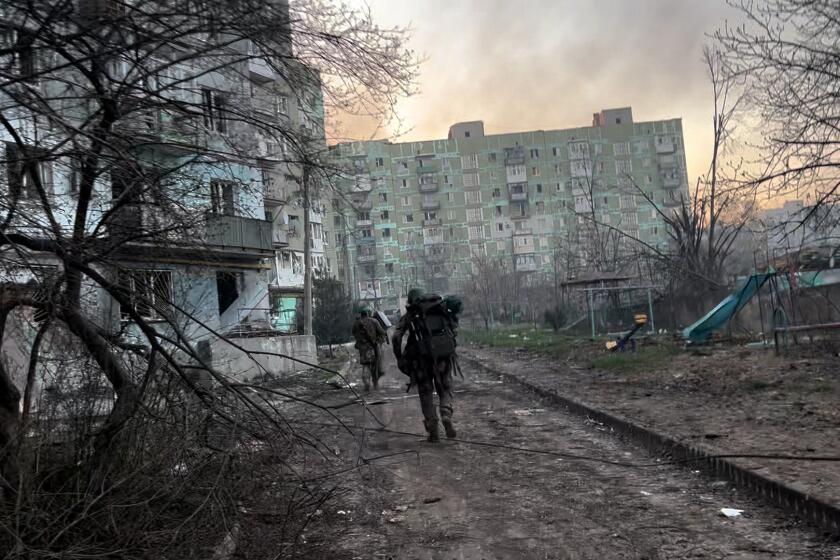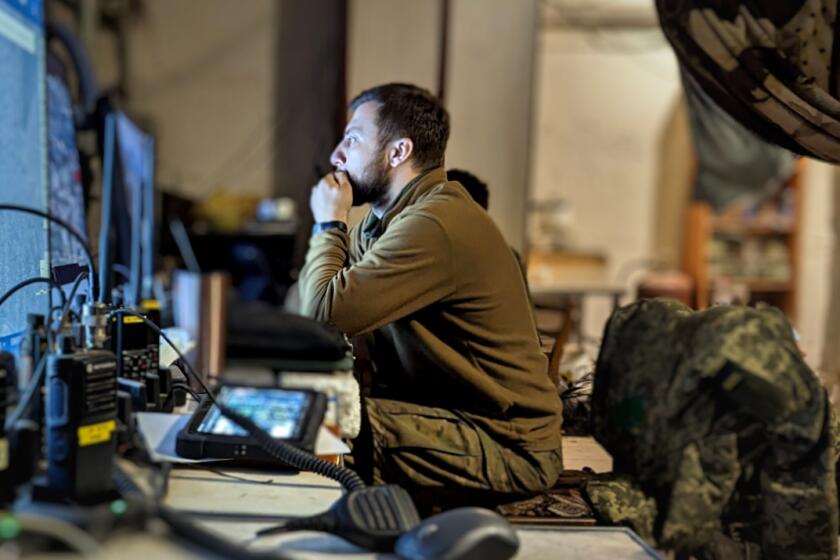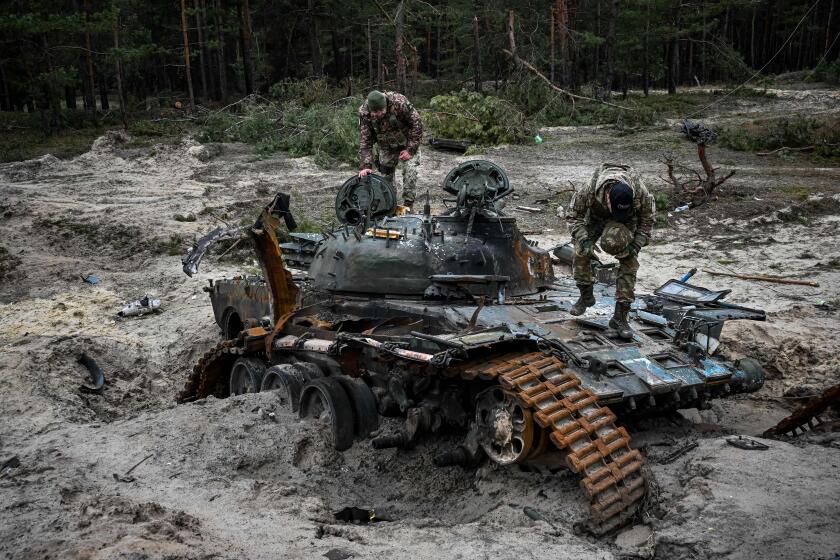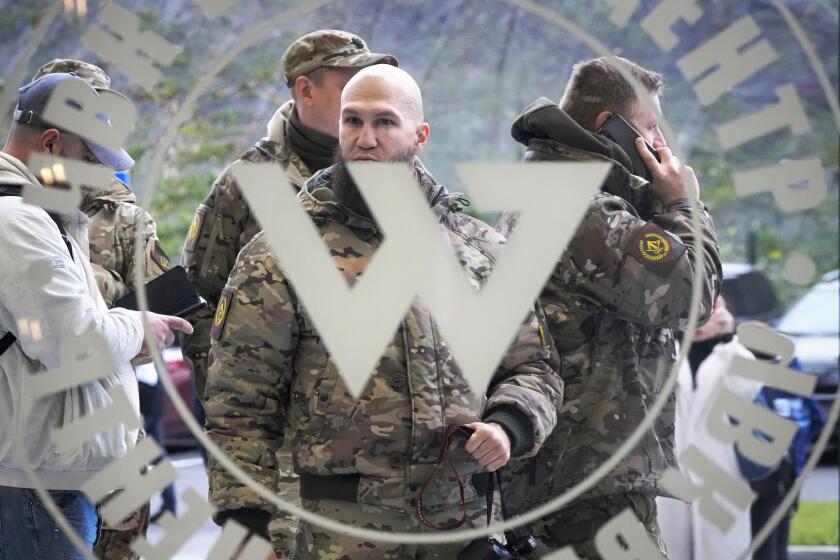Analysis: ‘Love fest’ for Zelensky in Europe shows worries over 2024 U.S. presidential race
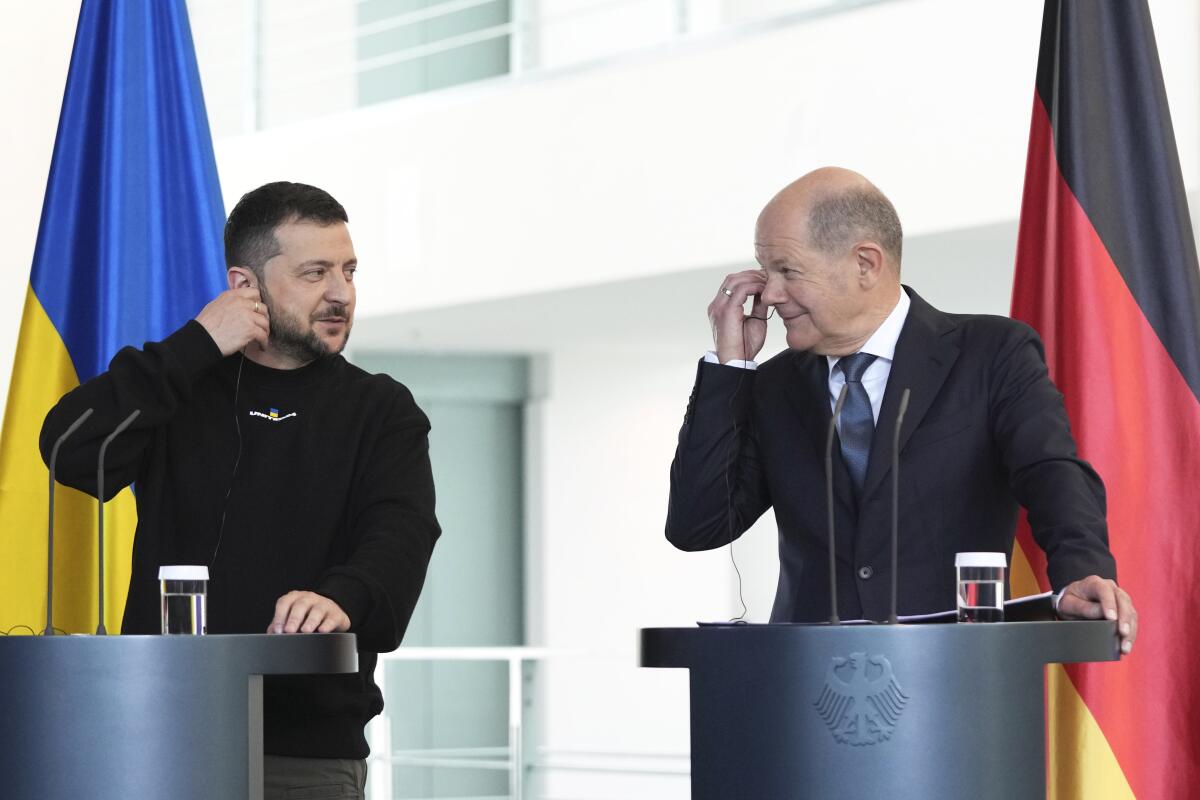
- Share via
BERLIN — It was a joking remark, but a telling one.
Standing alongside German Chancellor Olaf Scholz, in the midst of a whirlwind tour of Western European capitals, Ukrainian President Volodymyr Zelensky made note of Berlin’s role as the second-largest supplier of overall assistance to Ukraine, surpassed only by Washington.
“I think we’re going to work on making Germany supporter No. 1,” he said, as Scholz smiled along with him.
The seemingly lighthearted exchange, during Zelensky’s visit on Sunday to Germany — one of a rapid three-day succession of stops that also took him to Italy, to France and, on Monday, to Britain — belied a sense of grim urgency as Russia’s war on Ukraine enters a potentially pivotal phase.
Ukraine’s scramble for weaponry and political support from its allies, a near-constant quest since the full-scale Russian invasion of February 2022, is increasingly shadowed by worries over a heretofore unthinkable scenario — one in which the United States would no longer be Ukraine’s chief patron.
“It demonstrates, to some extent, that there is uncertainty in Europe over the next U.S. election,” said Liana Fix, a Europe fellow at the New York-based Council on Foreign Relations. “Europe wants to show that it will continue to help even if there is a change in U.S. policy, to make clear that this war is existential for Europeans as well as Ukraine.”
While there is recognition in European capitals that it’s still early in the U.S. presidential contest, former President Trump’s recent refusal to express hopes for a Ukrainian victory — a stark contrast with President Biden’s full-throated support, including a visit to Kyiv in February — caused a ripple of nervousness across the continent.
If war is hell, there’s a credible case Bakhmut is its ninth circle, as Russia besieges the Ukrainian city that has symbolic, if not strategic, value for both sides.
“Berlin is preparing for the possibility that Donald Trump could beat Joe Biden in the next election,” the newsmagazine Der Spiegel wrote last month, adding that such an outcome could spell “disaster” for Ukraine and for the North Atlantic Treaty Organization.
As Europe’s economic heavyweight, Germany has previously had a fraught and sometimes frosty relationship with Zelensky over how much wartime support it would offer.
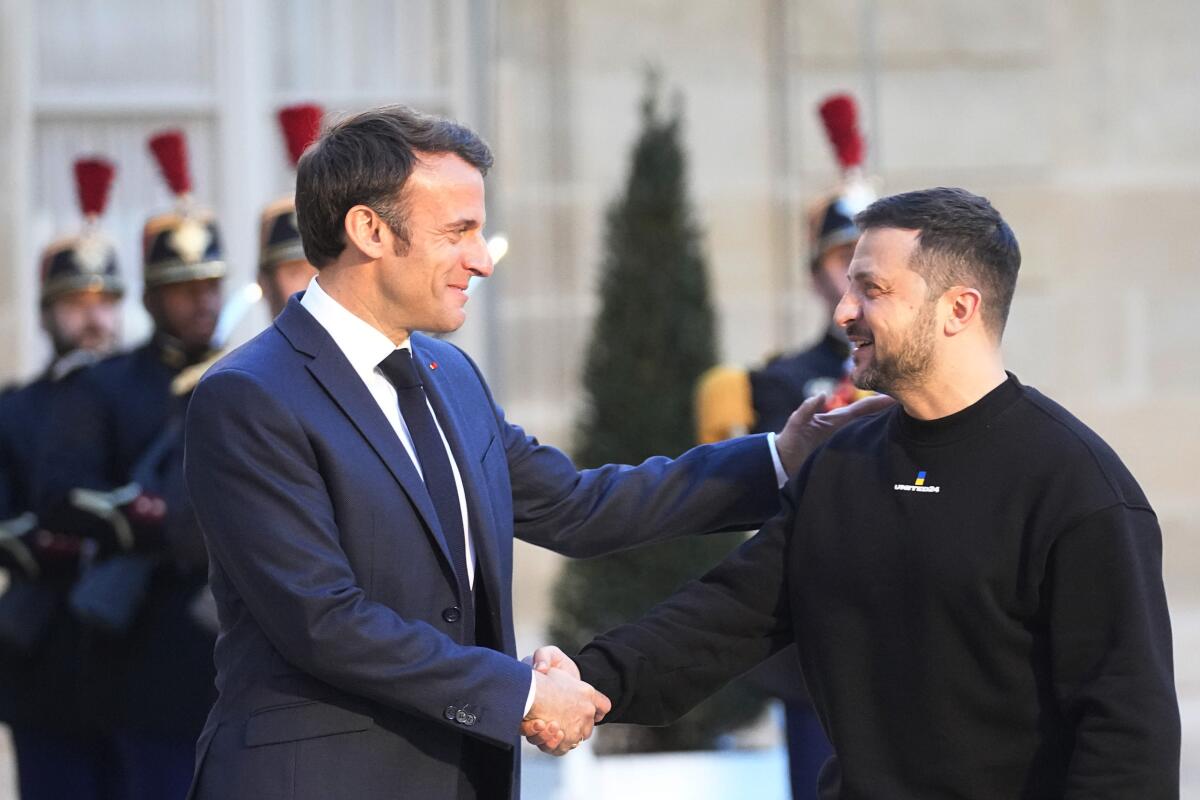
The weekend visit, the Ukrainian leader’s first to Berlin since the invasion, marked what was widely viewed as a distinct reset, with Scholz’s government unveiling its largest military aid package — nearly $3 billion worth — on the eve of the two leaders’ meeting.
Only a little over a year earlier, Ukrainian disapproval derailed a visit to Kyiv by German President Frank-Walter Steinmeier over his past warm relations with Russian President Vladimir Putin, a snub Scholz described as irritating. And Germany’s earlier foot-dragging over providing heavy weaponry was a monthslong source of tension.
The long fight for Bakhmut is backed by consumer tech — messaging apps, teleconferencing services, cloud-synced mapping software and drones.
It was a very different tone Sunday at the joint news conference in Berlin, where Zelensky cited help from friends like Germany as a means of making a Russian defeat “irreversible” this year.
Zelensky’s Sunday evening stop in France, not announced in advance, prompted a subtler parsing of his ties with the government of French President Emmanuel Macron.
The French leader had previously unsettled officials in Kyiv by repeatedly suggesting it would be reasonable to negotiate with Putin. But Sunday, after a three-hour dinner meeting, Macron and Zelensky said in a joint statement that France had offered training and promised to supply armored vehicles and light tanks for several Ukrainian battalions.
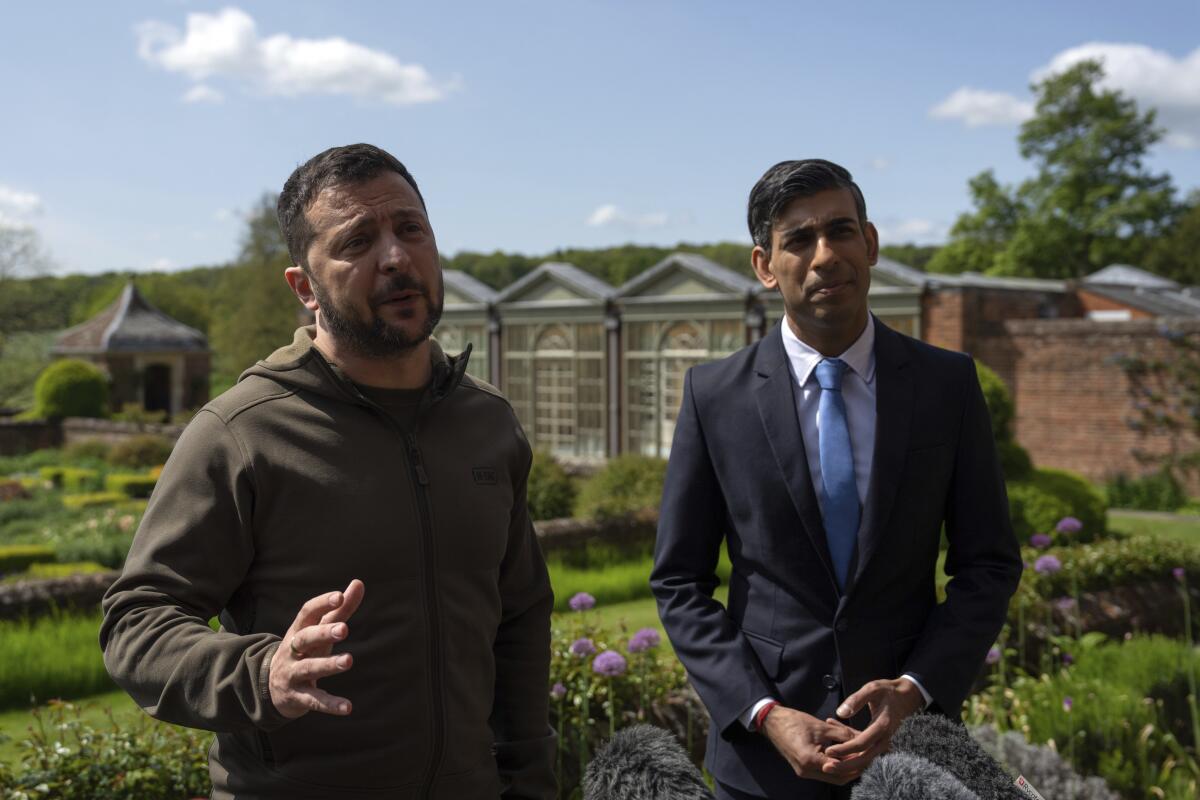
In Britain, another stop not announced in advance, Prime Minister Rishi Sunak enveloped Zelensky in a warm embrace after the Ukrainian leader arrived by helicopter at Chequers, the prime minister’s official retreat outside London.
Sunak, who in his relatively short tenure has emerged as a staunch backer of Ukraine, said Britain would be providing hundreds of additional air-defense missiles, as well as long-range attack drones.
That was on top of an announcement last week that Britain had already provided Ukraine with sophisticated Storm Shadow cruise missiles, with a range in excess of 150 miles — the first known delivery of its kind from a Western partner.
Germany’s new aid package will include 30 additional Leopard 1 tanks, along with Marder armored vehicles, air-defense systems and surveillance drones. But rather than portraying the new tranche of aid as bolstering a Ukrainian counteroffensive that could begin at almost any time, Germany signaled it was meant to demonstrate a long-term commitment.
The Ukrainian military’s surrender hotline, dubbed ‘I Want to Live,’ is enticing some Russian soldiers to quit the battlefield as the war drags on.
“We all hope for a rapid end to this terrible war by Russia against the Ukrainian people,” Germany’s defense minister, Boris Pistorius, said in a statement Saturday as the assistance was announced. “But unfortunately this is not in sight. This is why Germany will supply all the help that it can, for as long as necessary.”
For Ukraine, showcasing major new European commitments is a way of allaying concerns — which Moscow will likely seek to amplify — about the U.S. political climate potentially hampering future major commitments, analysts said.
“If I was [Zelensky], I would want clearly articulated European support in the run-up to the American election,” said Thomas Kleine-Brockhoff, a scholar at the German Marshall Fund in Berlin.
But Zelensky by no means came away with everything on his wish list as his country prepares for the coming counteroffensive against Russian forces — and in fact, much of the pledged new aid will not make its way through the pipeline before that military push begins in earnest.
Ukraine has long said Western fighter jets are perhaps the most urgent need, but even Britain did not make unambiguous promises on that score. Sunak promised imminent help in training Ukrainian pilots to use advanced Western combat aircraft, but told reporters a buildup of fighter combat aircraft capability for Kyiv is “not a straightforward thing.”
Russian private military contractor Wagner is busy boosting its brand as its fighters try to subdue Ukraine, trading secrecy for war propaganda movies.
Advanced fighter jets have been a major stumbling block for Western partners concerned about giving the appearance that NATO nations are engaging in direct confrontation with Russia.
This European tour — in what may be the last window for Zelensky to be absent from his capital for any length of time — also has yielded little movement on Kyiv’s often-repeated calls for the North Atlantic Treaty Organization to invite Ukraine to become a member.
“It is time to remove the biggest security uncertainty in Europe — that is, to make a positive political decision on our NATO membership,” Zelensky said in a prerecorded video for the Copenhagen Democracy Summit on Monday.
But in his Berlin appearance with the Ukrainian leader, Scholz sidestepped the subject, and public support for bringing Ukraine into the NATO fold has thus far been limited to countries on the alliance’s eastern edge.
Following the “unusual love fest” of this European tour, that’s “the next friction coming,” said Kleine-Brockhoff.
NATO Secretary-General Jens Stoltenberg, speaking in Copenhagen on Monday, said that while he expects a multiyear process of assisting Ukraine in laying the groundwork for a bid to join, there is little meaningful discussion to be had about Ukrainian accession unless it manages to remain a “sovereign independent nation in Europe.”
Even as Zelensky was wrapping up his appeals, Ukraine on Monday claimed some progress in one of the war’s bloodiest battles, in the eastern town of Bakhmut.
Ukrainian ground forces commander Oleksandr Syrskyi, on the messaging app Telegram, said the advance, although limited, proved that even under the most “extremely difficult conditions,” Ukraine was showing its determination to prevail.
“We are fighting with fewer resources than the enemy,” he wrote. “At the same time, we are able to thwart its plans.”
More to Read
Sign up for Essential California
The most important California stories and recommendations in your inbox every morning.
You may occasionally receive promotional content from the Los Angeles Times.
